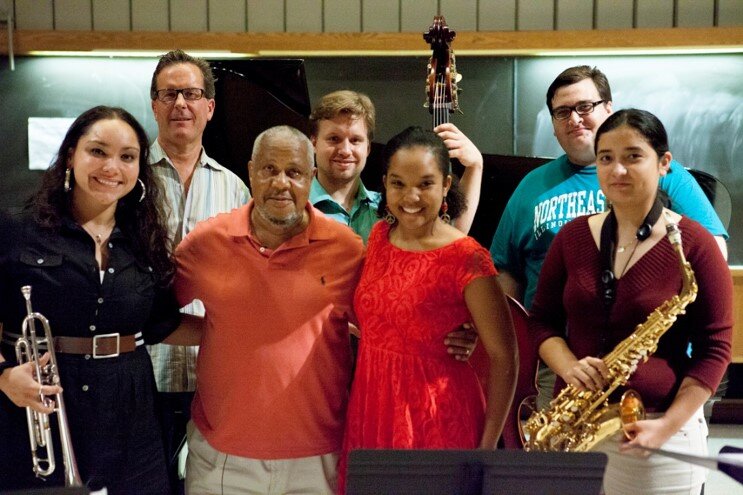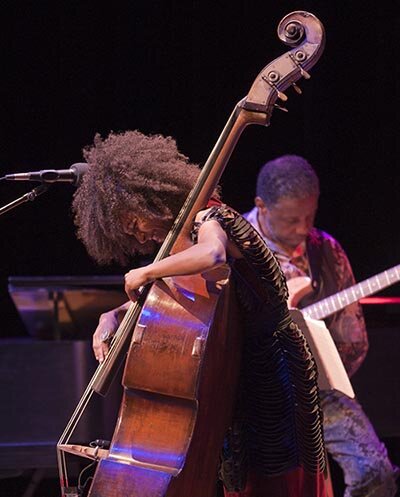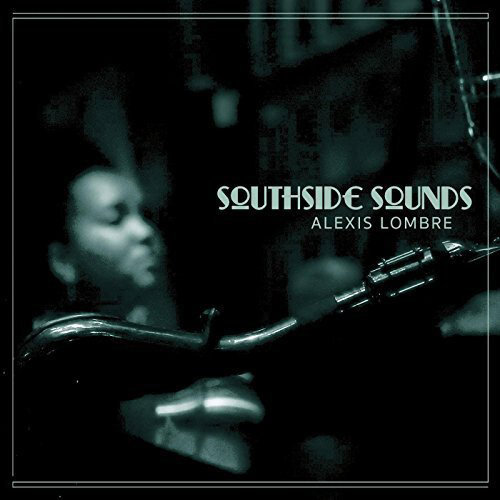By Jasminne Hernandez
Ravinia takes special pride in watching the young musicians engaged by the Jazz Mentor Program thrive as professionals after their school years, and some of those next steps have been seen up close in the Ravinia Steans Music Institute Program for Jazz. One of Ravinia’s longest-running Reach Teach Play music education initiatives, the Jazz Mentor Program unites talented Chicago Public High School students with a passion for jazz (the Jazz Scholars) with an ensemble of the city’s finest musicians in the field, who deepen their skills for performances, future studies, and music careers. The RSMI Program for Jazz invites young professional artists to focus on composition and performance alongside faculty artists Billy Childs, Rufus Reid, and Steve Wilson, workshopping original works in quintets to hone their collaborative music-making.
South Side–native pianist and vocalist Alexis Lombre is the latest outstanding artist to have come up through both Ravinia programs, and Backstage caught up with the now sometime Detroiter in the midst of work on her second solo album, which she’s dubbed an amalgamation of everything that she listens to and everything that she is. She’s been prepping the first single, “Come Find Me,” from the new collection of original tracks with a fellow Chicagoan, Grammy-winning guitarist Isaiah Sharkey, as producer, and Lombre has recently released a mini-documentary series on her YouTube channel to give fans a sneak peek at the creative process.
Read on to learn more about Lombre’s experiences at Ravinia, her influences in jazz, and her new music.
Alexis Lombre (center front, in red) in September 2013 with fellow Jazz Scholars, then leading Jazz Mentor Willie Pickens (center front, in orange), and then Ravinia CEO Welz Kauffman (rear left)
You were a Ravinia Jazz Scholar for four years, from 2012 to 2015—tell us about your experience joining and your first sessions with the Mentors and other Scholars.
The Mentors were what I really loved about it. They had a lot to give because they’re so experienced, and they have real knowledge of what touring and making a career in music is like. They saw I was really hungry to learn, so they just kept pouring out and kept pushing me and kept investing in me because they knew that I wanted it and that’s what I loved. It was a really beautiful relationship. And it was so great to have that during high school because it really gave me something to work toward.
Did you feel any “seniority” in the ensemble by year four, or take on any special roles with the other Scholars?
Within the program there were lots of opportunities for the Scholars, so seniority spoke for itself [in other ways]. By the time I was a senior in high school, I was gigging professionally around the city regularly. I really learned how to be at that professional level because I had professional jazz musicians teaching me, showing me how to go the extra mile, and I just kept soaking that up. It was perfect.
How did your time as a Ravinia Jazz Scholar prepare you to join the Ravinia Steans Music Institute jazz program in 2017?
Music is a tough business, so you need thick skin if you’re going to last, and the Mentors definitely instilled that in me early on. They prepared me and shaped who I am today, to have that toughness and intensity. That was a difference maker, between being taught in high school and [working] as a young professional. At RSMI, there is no way you can succeed in that program without having discipline and some toughness about you from the start that [the faculty] can build upon. So it was just like the next level. The Jazz Mentor program is molding clay into a pot, while the RSMI program is putting that molded clay into a 5,000-degree Fahrenheit kiln to make this polished product.
What about the RSMI jazz program drew you to accept the invitation?
I knew that I was going to learn so much, and all expenses were taken care of, so it was really about [all of us there] going in and focusing on our music. I had the opportunity to work with Rufus Reid, Billy Childs, and Nathan Davis and it was amazing! It was vigorous, but it was so much fun. You can see the smile on my face!
Lombre performing at RSMI’s Jazz Grandstand concert in 2017
What opportunities did your Ravinia experiences open for you?
I started touring more internationally and nationally after RSMI, but both programs really got me ready for international and professional touring and travel. During my time at RSMI, I was around all these young people. We all wanted to work, jam, and party together all at the same time, but then we had to crunch and do the work. It was chaotic like tour life, except we’re at one place for a week and a half. But I think that got my mind set for how things can be “work hard and play hard.” Rufus Reid put it like this for me: If you’re being put on a tour and people are paying you, then you are expected to play at the highest level regardless of what’s going on in your life. It was the same expectation at RSMI; we had long rigorous hours of work, but at the end of the day a certain quality is expected, and you need to produce that no matter what.
Jazz has been a fairly male-dominated music genre—does being a woman in jazz influence your music?
Of course, I can’t change being a lady! So I play like a lady, you know? I’m not trying to play like a guy. I’m really playing like a young Black woman because that’s really all I can do.
Esperanza Spalding performing at Ravinia in 2012
Is there a woman in jazz that has inspired you?
Esperanza Spalding, 10 million percent. She is everything and more. I first saw her when I was 12. She was playing the bass and she looked like me! As her career went on, she always refused to be put in a box and has allowed her creativity to flow without outside opinions phasing her at all. She’s just such a fearless and innovative artist. It’s already hard to just exist as a woman in music because so many people just want you to be beneath them. I can’t imagine how difficult it must have been to push boundaries as much as Esperanza did. It’s just so amazing, and I want to do that, too, but in my own way. I’m not going to be Esperanza Spalding, I want to be the best Alexis Lombre.
Over the past year, have you caught the “creative bug” or used your creative outlet in an unexpected way?
Absolutely! I feel like the pandemic has forced a lot of us musicians to be creative, and it made me realize that in order to succeed you have to be as creative about how you make money as you are about the music itself. I’ve been writing a lot of songs because there are a lot of emotional things happening in society, and that’s one of the things I’ve used to keep my sanity. I really write music for my mental health, and that’s one of the only things that’s really kept me together. I’ve also started to get into producing albums now, which I’m excited about, and I’m a virtual freelance teacher.
Tell us about a typical day recording your first album and from your upcoming one. Did the process look or feel similar, or were there unique experiences?
Southside Sounds, Lombre’s first album, released in 2017
The first album was a [traditional] jazz album. My band and I played a lot of the songs in gigs, so we knocked out the tracks and finished the album in three to four hours. With this album, I’m doing something new, so it’s a lot of trial and error and it’s not as simple as getting the band together and finishing the record in a day. I have to figure out what timbre I like, re-record tracks in different keys, and so much more.
Documenting your recording process for this new album, have you learned something about your musical mind while giving us this peek inside?
I learned how emotionally driven I am. When I listen and watch the documentary back, I get different meanings out of the songs each time. A lot of the album is about liberating oneself from anything that’s oppressive, which could be people’s opinions or expectations of you. I’m hoping that the authenticity of the album will draw people in.
You’ve been working with a fellow Chicagoan, guitarist Isaiah Sharkey, as producer on the album and your first single, “Come Find Me.” We heard him on our stage in 2019; how did you connect with him and what has he brought out of you in the recording?
Trumpeter Maurice Brown, another RSMI alum, hosts an annual Christmas jam session, and Isaiah was performing on the set with him. Maurice let me sit in and play with the band, and then me and Isaiah connected and got each other’s information. I played keys on his track “Come” from his last album, Love is the Key. We just kept in touch. When I showed him “Come Find Me,” he offered to produce it.
Lombre in the studio working on her second album
That man is a genius. What’s funny about it is that I’m used to people who are geniuses, but they’re really intense whereas Isaiah is very relaxed, very calm. He’s very patient and at the same time very pressing towards greatness. He made me accept and realize that I do have greatness in me. Before, I understood it to a degree, but I knew I wanted something more on an international level. Hanging out with Isaiah, his influence on me and the way he has validated me has really made me see that it’s okay to be different and okay to be who I am.
What’s next for Alexis Lombre?
I’m just going to put out a bunch of albums and help other people put out albums. I want to tour all over the world when it’s safe again. It would be great if I can win a Grammy or two; I’d be down for that! I’m just going to keep doing my thing, and hopefully I’ll be able to be in a position to give back, too, which I look forward to doing because that’s how things continue, when you give back.






